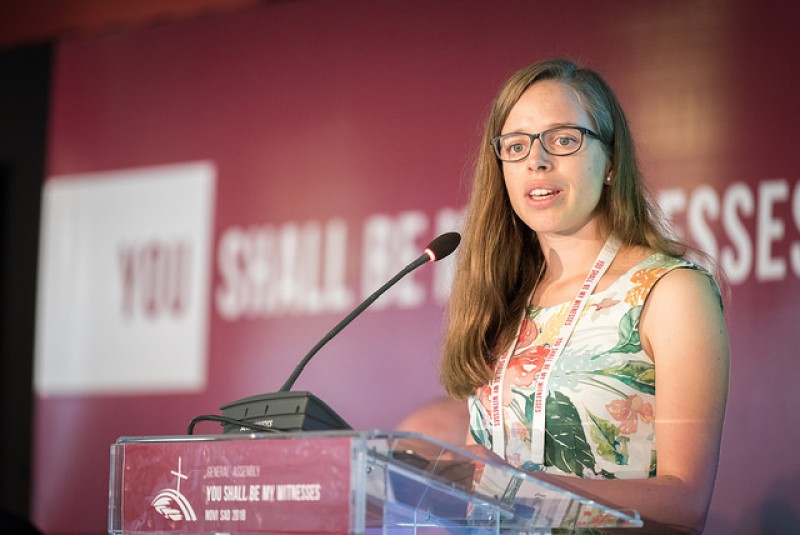Lisa Schneider, keynote speaker at the General Assembly. Photo: Albin Hillert/CEC
By Lisa Menzel and Lassi Pappinen
When it comes to justice, everyone at the General Assembly will agree that CEC should somehow get involved in that topic—it is even one of the three daily themes of the 2018 Novi Sad General Assembly of the Conference of European Churches. Nevertheless, in an organisation of 114 Member Churches no concept is as straightforward as it might seem. The assembly, therefore, acts as a vital forum in finding a shared understanding in advocating for justice. In addition to keynote address on the theme, participants also attend workshops on topics ranging from social imbalances to ecological injustices.
As Lisa Schneider, the keynote speaker on justice, points out, “There will always be different views of what is just. It is our Christian mandate to strive for justice and do our utmost to achieve it. Here we are fallible.” Schneider stands in high contrast to the others speakers at General Assembly: She is not talking as an expert, but from her experiences as a lawyer in Germany and especially from her experiences at volunteering in Protestant youth organisations, the latest as member and chairperson of the Executive Committee of the Ecumenical Youth Council in Europe (EYCE) until September 2017.
“It becomes really hard to try and reconcile justice with Christian teaching when the situations become more complex,” she said in her speech. Especially when it comes to the terms of decision making processes and commitment to the rights of children and youth, she still sees some deficits. In her opinion, youth organisations are a key place where children and young people learn about justice. “Volunteer leaders also learn a huge amount. Through what they do, from each other and particularly from the children,” Schneider continued. “In fact, through my voluntary work I have acquired skills that are most relevant in professional life.”
Schneider expects the Member Churches of CEC to live up to their position as role models for justice. “Young people are serious about justice and ready to think out of the box. They have perseverance and enthusiasm, a thirst for knowledge and curiosity. They perhaps have no natural sense of justice, but all the more need for it. In their quest they need the support of their churches.”
In his reflection on this keynote address, Bishop Dr. Patrick Streiff from the United Methodist Church (EMK) emphasized the relational nature of the concept of justice. Citing a verse from the book of Micah (6:8) Streiff remarked that justice indeed is acting in relationship to each other. That makes justice a vital factor in building communities of today. In Streiff’s view biblical stories are also relevant in a world that is becoming more complex. “Churches’ task is to make biblical stories relevant to modern people. There are many people—and not only in western Europe—who do not know these stories anymore. We, theologists and pastors are to blame for not telling about them. Biblical stories are still able to speak to our society and motivate people to act justly.”
David Bajac, theology student and Youth Advisor for the Serbian Orthodox Church, does not consider justice as something people can bring about all by themselves. In his view, Christian churches should not act like political parties but rather as God’s voice in the world.
Bajac, a Novi Sad local, calls churches to look after divine justice: “We should insist on justice but at the same time bear in mind that in the end, we can’t find justice in this world without God.”
For high resolution photos click here
